formerly eScholarship Editions


|
|
|
|
Your search for
'Californian and Western History' in subject
found 68 book(s). | Modify Search | Displaying 41 - 60 of 68 book(s) | |
| 41. | 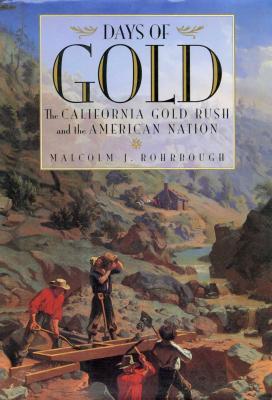 | Title: Days of gold: the California Gold Rush and the American nation Author: Rohrbough, Malcolm J Published: University of California Press, 1997 Subjects: History | California and the West | Californian and Western History | United States History | American Studies | Gender Studies Publisher's Description: On the morning of January 24, 1848, James W. Marshall discovered gold in California. The news spread across the continent, launching hundreds of ships and hitching a thousand prairie schooners filled with adventurers in search of heretofore unimagined wealth. Those who joined the procession - soon called 49ers - included the wealthy and the poor from every state and territory, including slaves brought by their owners. In numbers, they represented the greatest mass migration in the history of the Republic.In this first comprehensive history of the Gold Rush, Malcolm J. Rohrbough demonstrates that in its far-reaching repercussions, it was the most significant event in the first half of the nineteenth century. No other series of events between the Louisiana Purchase and the Civil War produced such a vast movement of people; called into question basic values of marriage, family, work, wealth, and leisure; led to so many varied consequences; and left such vivid memories among its participants.Through extensive research in diaries, letters, and other archival sources, Rohrbough uncovers the personal dilemmas and confusion that the Gold Rush brought. His engaging narrative depicts the complexity of human motivation behind the event and reveals the effects of the Gold Rush as it spread outward in ever-widening circles to touch the lives of families and communities everywhere in the United States. For those who joined the 49ers, the decision to go raised questions about marital obligations and family responsibilities. For those men - and women, whose experiences of being left behind have been largely ignored until now - who remained on the farm or in the shop, the absences of tens of thousands of men over a period of years had a profound impact, reshaping a thousand communities across the breadth of the American nation. [brief] Similar Items |
| 42. | 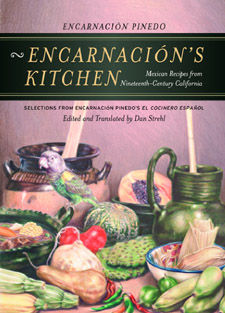 | Title: Encarnación's kitchen: Mexican recipes from nineteenth-century California: selections from Encarnación Pinedo's El cocinero español Author: Pinedo, Encarnación b. 1848 Published: University of California Press, 2003 Subjects: Food and Cooking | California and the West | Californian and Western History | Ethnic Studies | Women's Studies Publisher's Description: In 1991 Ruth Reichl, then a Los Angeles Times food writer, observed that much of the style now identified with California cuisine, and with nouvelle cuisine du Mexique, was practiced by Encarnación Pinedo a century earlier. A landmark of American cuisine first published in 1898 as El cocinero español (The Spanish Cook), Encarnación's Kitchen is the first cookbook written by a Hispanic in the United States, as well as the first recording of Californio food - Mexican cuisine prepared by the Spanish-speaking peoples born in California. Pinedo's cookbook offers a fascinating look into the kitchens of a long-ago culture that continues to exert its influence today. Of some three hundred of Pinedo's recipes included here - a mixture of Basque, Spanish, and Mexican - many are variations on traditional dishes, such as chilaquiles, chiles rellenos, and salsa (for which the cook provides fifteen versions). Whether describing how to prepare cod or ham and eggs (a typical Anglo dish labeled "huevos hipócritas" ), Pinedo was imparting invaluable lessons in culinary history and Latino culture along with her piquant directions. In addition to his lively, clear translation, Dan Strehl offers a remarkable view of Pinedo's family history and of the material and literary culture of early California cooking. Prize-winning journalist Victor Valle puts Pinedo's work into the context of Hispanic women's testimonios of the nineteenth century, explaining how the book is a deliberate act of cultural transmission from a traditionally voiceless group. [brief] Similar Items |
| 43. | 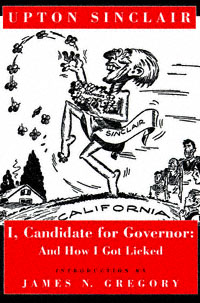 | Title: I, candidate for governor: and how I got licked Author: Sinclair, Upton 1878-1968 Published: University of California Press, 1994 Subjects: History | Politics | California and the West | United States History | Californian and Western History | Autobiography | American Studies Publisher's Description: Here, reprinted for the first time since its original publication, is muckraking journalist Upton Sinclair's lively, caustic account of the 1934 election campaign that turned California upside down and almost won him the governor's mansion.Using his "End Poverty in California" movement (more commonly called EPIC) as a springboard, Sinclair ran for governor as a Democrat, equipped with a bold plan to end the Depression in California by taking over idle land and factories and turning them into cooperative ventures for the unemployed. To his surprise, thousands rallied to the idea, converting what he had assumed would be another of his utopian schemes into a mass political movement of extraordinary dimensions. With a loosely knit organization of hundreds of local EPIC clubs, Sinclair overwhelmed the moderate Democratic opposition to capture the primary election. When it came to the general election, however, his opposition employed highly effective campaign tactics: overwhelming media hostility, vicious red-baiting and voter intimidation, high-priced dirty tricks. The result was a resounding defeat in November. I, Candidate tells the story of Sinclair's campaign while also capturing the turbulent political mood of the 1930s. Employing his trademark muckraking style, Sinclair exposes the conspiracies of power that ensured big-money control over the media and other powerful institutions. [brief] Similar Items |
| 44. | 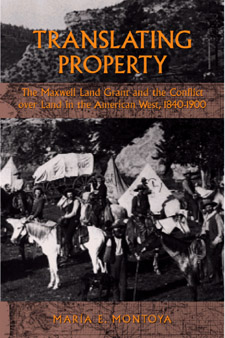 | Title: Translating property: the Maxwell Land Grant and the conflict over land in the American West, 1840-1900 Author: Montoya, María E 1964- Published: University of California Press, 2002 Subjects: History | Californian and Western History | Law | Latino Studies | California and the West | California and the West Publisher's Description: Although Mexico lost its northern territories to the United States in 1848, battles over property rights and ownership have remained intense. This turbulent, vividly narrated story of the Maxwell Land Grant, a single tract of 1.7 million acres in northeastern New Mexico, shows how contending groups reinterpret the meaning of property to uphold their conflicting claims to land. The Southwest has been and continues to be the scene of a collision between land regimes with radically different cultural conceptions of the land's purpose. We meet Jicarilla Apaches, whose identity is rooted in a sense of place; Mexican governors and hacienda patrons seeking status as New World feudal magnates; "rings" of greedy territorial politicians on the make; women finding their own way in a man's world; Anglo homesteaders looking for a place to settle in the American West; and Dutch investors in search of gargantuan returns on their capital. The European and American newcomers all "mistranslated" the prior property regimes into new rules, to their own advantage and the disadvantage of those who had lived on the land before them. Their efforts to control the Maxwell Land Grant by wrapping it in their own particular myths of law and custom inevitably led to conflict and even violence as cultures and legal regimes clashed. [brief] Similar Items |
| 45. | 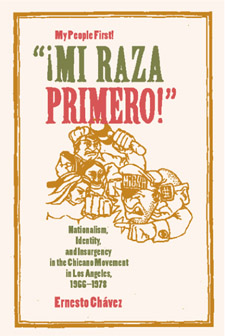 | Title: "Mi raza primero!" (My people first!): nationalism, identity, and insurgency in the Chicano movement in Los Angeles, 1966-1978 Author: Chávez, Ernesto 1962- Published: University of California Press, 2002 Subjects: History | California and the West | Californian and Western History | Chicano Studies | Sociology | Politics | Social Problems | Immigration Publisher's Description: ¡Mi Raza Primero! is the first book to examine the Chicano movement's development in one locale - in this case Los Angeles, home of the largest population of people of Mexican descent outside of Mexico City. Ernesto Chávez focuses on four organizations that constituted the heart of the movement: The Brown Berets, the Chicano Moratorium Committee, La Raza Unida Party, and the Centro de Acción Social Autónomo, commonly known as CASA. Chávez examines and chronicles the ideas and tactics of the insurgency's leaders and their followers who, while differing in their goals and tactics, nonetheless came together as Chicanos and reformers. Deftly combining personal recollection and interviews of movement participants with an array of archival, newspaper, and secondary sources, Chávez provides an absorbing account of the events that constituted the Los Angeles-based Chicano movement. At the same time he offers insights into the emergence and the fate of the movement elsewhere. He presents a critical analysis of the concept of Chicano nationalism, an idea shared by all leaders of the insurgency, and places it within a larger global and comparative framework. Examining such variables as gender, class, age, and power relationships, this book offers a sophisticated consideration of how ethnic nationalism and identity functioned in the United States during the 1960s and 1970s. [brief] Similar Items |
| 46. | 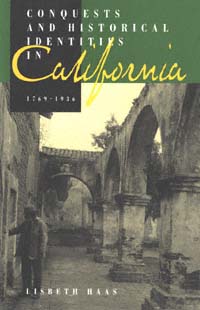 | Title: Conquests and historical identities in California, 1769-1936 Author: Haas, Lisbeth Published: University of California Press, 1995 Subjects: History | Californian and Western History | Ethnic Studies | Latino Studies | American Studies | Gender Studies | California and the West | United States History Publisher's Description: Spanning the period between Spanish colonization and the early twentieth century, this well-argued and convincing study examines the histories of Spanish and American conquests, and of ethnicity, race, and community in southern California. Lisbeth Haas draws on a diverse body of source materials (mission and court archives, oral histories, Spanish language plays, census and tax records) to build a new picture of rural society and social change.A borderlands and Chicano history, Haas's work provides a richly textured study of events that took place in and around San Juan Capistrano and Santa Ana in present-day Orange County. She provides a vivid sense of how and why the past acquires meaning in the lives that make up the historical identities she discusses. The voices of Juaneño and Luiseño Indians, Californios, and Mexicans are heard along the shifting faultlines of economic, social, and political change.This is one of the first truly multiethnic histories of California and of the West. It makes clear that issues of multiculturalism and ethnicity are not recent manifestations in California - they have characterized social and cultural relationships there since the late eighteenth century. [brief] Similar Items |
| 47. | 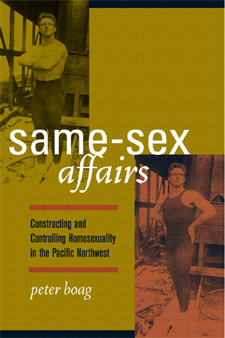 | Title: Same-sex affairs: constructing and controlling homosexuality in the Pacific Northwest Author: Boag, Peter Published: University of California Press, 2003 Subjects: Gender Studies | History | Men and Masculinity | Californian and Western History | Urban Studies | GayLesbian and Bisexual Studies | Sociology Publisher's Description: At the turn of the twentieth century, two distinct, yet at times overlapping, male same-sex sexual subcultures had emerged in the Pacific Northwest: one among the men and boys who toiled in the region's logging, fishing, mining, farming, and railroad-building industries; the other among the young urban white-collar workers of the emerging corporate order. Boag draws on police logs, court records, and newspaper accounts to create a vivid picture of the lives of these men and youths--their sexual practices, cultural networks, cross-class relations, variations in rural and urban experiences, and ethnic and racial influences. [brief] Similar Items |
| 48. | 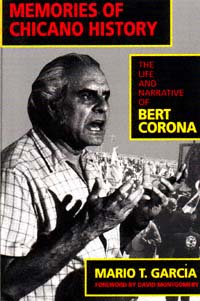 | Title: Memories of Chicano history: the life and narrative of Bert Corona Author: García, Mario T Published: University of California Press, 1994 Subjects: History | United States History | Latino Studies | Chicano Studies | Autobiography | Californian and Western History | Autobiographies and Biographies Publisher's Description: Who is Bert Corona? Though not readily identified by most Americans, nor indeed by many Mexican Americans, Corona is a man of enormous political commitment whose activism has spanned much of this century. Now his voice can be heard by the wide audience it deserves. In this landmark publication - the first autobiography by a major figure in Chicano history - Bert Corona relates his life story.Corona was born in El Paso in 1918. Inspired by his parents' participation in the Mexican Revolution, he dedicated his life to fighting economic and social injustice. An early labor organizer among ethnic communities in southern California, Corona has agitated for labor and civil rights since the 1940s. His efforts continue today in campaigns to organize undocumented immigrants.This book evolved from a three-year oral history project between Bert Corona and historian Mario T. García. The result is a testimonio , a collaborative autobiography in which historical memories are preserved more through oral traditions than through written documents. Corona's story represents a collective memory of the Mexican-American community's struggle against discrimination and racism. His narration and García's analysis together provide a journey into the Mexican-American world.Bert Corona's reflections offer us an invaluable glimpse at the lifework of a major grass-roots American leader. His story is further enriched by biographical sketches of others whose names have been little recorded during six decades of American labor history. [brief] Similar Items |
| 49. | 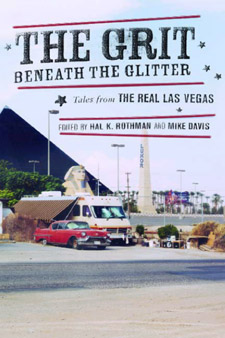 | Title: The grit beneath the glitter: tales from the real Las Vegas Author: Rothman, Hal 1958- Published: University of California Press, 2002 Subjects: American Studies | Sociology | Politics | California and the West | Urban Studies | Geography | Environmental Studies | Californian and Western History Publisher's Description: The Grit Beneath the Glitter is the first real look at the new Las Vegas from the inside. In it, long-time residents as well as professionals reflect on the transformation of one of the fastest-growing and most famous cities on earth, yet one about which relatively little is known. They offer a lively and compelling portrait of the other side of Las Vegas: the people and institutions that support the glitter of the gaming and entertainment industry. Examining a range of topics--from the city's commercial history, labor conditions, and environmental problems to an analysis of the famous lights of the Strip--the contributors uncover the contradictions between the illusion and the reality of the city, the seam between fantasy and the life it masks. The essays in this collection explore the world that employees experience when they enter gaming palaces from an employee entrance in a back parking lot rather than through the scripted doors of casino/hotel palaces. They take readers into the neighborhoods where 1.4 million Americans now live, attend school, eat dinner, and go to work. [brief] Similar Items |
| 50. | 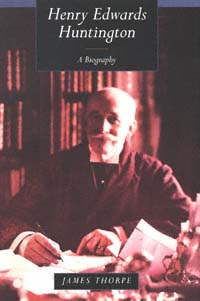 | Title: Henry Edwards Huntington: a biography Author: Thorpe, James Ernest 1915- Published: University of California Press, 1994 Subjects: History | California and the West | Californian and Western History | United States History | Autobiographies and Biographies Publisher's Description: A legendary book collector, a connoisseur of fine art, a horticulturist, and a philanthropist, Henry Edwards Huntington is perhaps best known as the founder of the world-renowned Huntington Library, Art Gallery, and Botanical Gardens in San Marino, California. James Thorpe's comprehensive biography of Huntington tells the richly human story of the man who became America's greatest book collector and was a leading figure in the development of southern California.Henry Edwards Huntington was born in New York State in 1850. He began working at the age of 17, eventually moved to California, and in later years was hailed for his vision in developing the street railway system that created the structure of the Los Angeles area. Always a lover of books, Huntington acquired many spectacular volumes - among them the complete Gutenberg Bible on vellum and the library of the Earl of Bridgewater. He also built a splendid art collection and established a grand botanical garden on the grounds of the buildings that would house his art and books. Then, in an act of philanthropy seldom equaled, he gave these great treasures to the public.The intimate side of Huntington's life appears in these pages, too. Thorpe has culled a vast trove of private letters, diaries, and other documents that reveal Huntington's exceptional personal qualities. The author's well-rounded biography of this unassuming yet gifted American is also richly evocative of the times in which Henry Edwards Huntington lived. [brief] Similar Items |
| 51. | 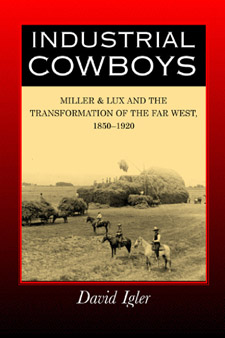 | Title: Industrial cowboys: Miller & Lux and the transformation of the Far West, 1850-1920 Author: Igler, David 1964- Published: University of California Press, 2001 Subjects: History | United States History | Californian and Western History | Environmental Studies | California and the West | Agriculture | Economics and Business Publisher's Description: Few industrial enterprises left a more enduring imprint on the American West than Miller & Lux, a vast meatpacking conglomerate started by two San Francisco butchers in 1858. Industrial Cowboys examines how Henry Miller and Charles Lux, two German immigrants, consolidated the West's most extensive land and water rights, swayed legislatures and courts, monopolized western beef markets, and imposed their corporate will on California's natural environment. Told with clarity and originality, this story uses one fascinating case study to illuminate the industrial development and environmental transformation of the American West during the late nineteenth and early twentieth centuries. The process by which two neighborhood butchers turned themselves into landed industrialists depended to an extraordinary degree on the acquisition, manipulation, and exploitation of natural resources. David Igler examines the broader impact that industrialism--as exemplified by Miller & Lux--had on landscapes and waterscapes, and on human as well as plant and animal life in the West. He also provides a rich discussion of the social relations engineered by Miller & Lux, from the dispossession of Californio rancheros to the ethnic segmentation of the firm's massive labor force. The book also covers such topics as land acquisition and reclamation, water politics, San Francisco's unique business environment, and the city's relation to its surrounding hinterlands. Above all, Igler highlights essential issues that resonate for us today: who holds the right and who has the power to engineer the landscape for market production? [brief] Similar Items |
| 52. | 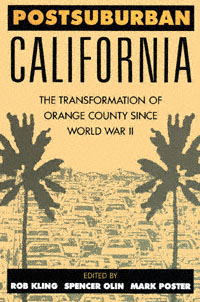 | Title: Postsuburban California: the transformation of Orange County since World War II Author: Kling, Rob Published: University of California Press, 1995 Subjects: History | Sociology | United States History | American Studies | California and the West | Urban Studies | Californian and Western History Publisher's Description: Neither a city nor a traditional suburb, Orange County, California represents a striking example of a new kind of social formation. This multidisciplinary volume offers a cogent case study of the "postsuburban" phenomenon. Similar Items |
| 53. | 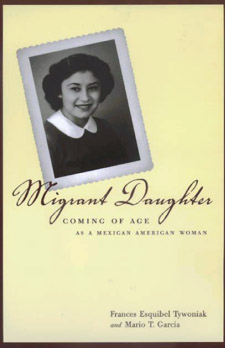 | Title: Migrant daughter: coming of age as a Mexican American woman Author: Tywoniak, Frances Esquibel 1931- Published: University of California Press, 2000 Subjects: Ethnic Studies | Women's Studies | Chicano Studies | California and the West | Californian and Western History | Autobiographies and Biographies Publisher's Description: Taking us from the open spaces of rural New Mexico and the fields of California's Great Central Valley to the intellectual milieu of student life in Berkeley during the 1950s, this memoir, based on an oral history by Mario T. García, is the powerful and moving testimonio of a young Mexican American woman's struggle to rise out of poverty. Migrant Daughter is the coming-of-age story of Frances Esquibel Tywoniak, who was born in Spanish-speaking New Mexico, moved with her family to California during the Depression to attend school and work as a farm laborer, and subsequently won a university scholarship, becoming one of the few Mexican Americans to attend the University of California, Berkeley, at that time. Giving a personal perspective on the conflicts of living in and between cultures, this eloquent story provides a rare glimpse into the life of a young Mexican American woman who achieved her dreams of obtaining a university education. In addition to the many fascinating details of everyday life the narrative provides, Mario T. García's introduction contextualizes the place and importance of Tywoniak's life. Both introduction and narrative illustrate the process by which Tywoniak negotiated her relation to ethnic identity and cultural allegiances, the ways in which she came to find education as a channel for breaking with fieldwork patterns of life, and the effect of migration on family and culture. This deeply personal memoir portrays a courageous Mexican American woman moving between many cultural worlds, a life story that at times parallels, and at times diverges from, the real life experiences of thousands of other, unnamed women. [brief] Similar Items |
| 54. | 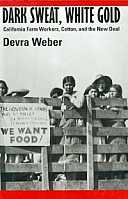 | Title: Dark sweat, white gold: California farm workers, cotton, and the New Deal Author: Weber, Devra 1946- Published: University of California Press, 1994 Subjects: History | Californian and Western History | Latino Studies | Labor Studies | California and the West | African History Publisher's Description: In her incisive analysis of the shaping of California's agricultural work force, Devra Weber shows how the cultural background of Mexican and, later, Anglo-American workers, combined with the structure of capitalist cotton production and New Deal politics, forging a new form of labor relations. She pays particular attention to Mexican field workers and their organized struggles, including the famous strikes of 1933.Weber's perceptive examination of the relationships between economic structure, human agency, and the state, as well as her discussions of the crucial role of women in both Mexican and Anglo working-class life, make her book a valuable contribution to labor, agriculture, Chicano, Mexican, and California history. [brief] Similar Items |
| 55. | 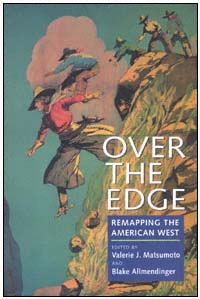 | Title: Over the edge: remapping the American West Author: Matsumoto, Valerie J Published: University of California Press, 1999 Subjects: American Studies | California and the West | Popular Culture | History | United States History | Californian and Western History | German Studies Publisher's Description: From the Gold Rush to rush hour, the history of the American West is fraught with diverse, subversive, and at times downright eccentric elements. This provocative volume challenges traditional readings of western history and literature, and redraws the boundaries of the American West with absorbing essays ranging widely on topics from tourism to immigration, from environmental battles to interethnic relations, and from law to film. Taken together, the essays reassess the contributions of a diverse and multicultural America to the West, as they link western issues to global frontiers.Featuring the latest work by some of the best new writers both inside and outside academia, the original essays in Over the Edge confront the traditional field of western American studies with a series of radical, speculative, and sometimes outrageous challenges. The collection reads the West through Ben-Hur and the films of Mae West; revises the western American literary canon to include the works of African American and Mexican American writers; examines the implications of miscegenation law and American Indian blood quantum requirements; and brings attention to the historical participation of Mexican and Japanese American women, Native American slaves, and Alaskan cannery workers in community life. [brief] Similar Items |
| 56. | 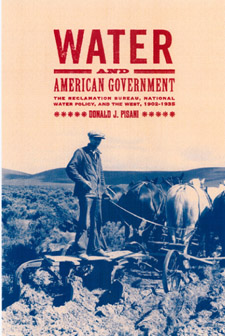 | Title: Water and American government: the Reclamation Bureau, national water policy, and the West, 1902-1935 Author: Pisani, Donald J Published: University of California Press, 2002 Subjects: History | United States History | Water | Public Policy | Geography | California and the West | Californian and Western History Publisher's Description: Donald Pisani's history of perhaps the boldest economic and social program ever undertaken in the United States--to reclaim and cultivate vast areas of previously unusable land across the country - shows in fascinating detail how ambitious government programs fall prey to the power of local interest groups and the federal system of governance itself. What began as the underwriting of a variety of projects to create family farms and farming communities had become by the 1930s a massive public works and regional development program, with an emphasis on the urban as much as on the rural West. [brief] Similar Items |
| 57. | 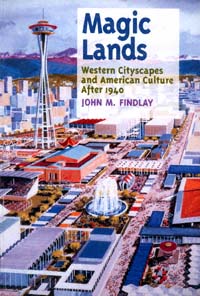 | Title: Magic lands: western cityscapes and American culture after 1940 Author: Findlay, John M 1955- Published: University of California Press, 1992 Subjects: History | United States History | California and the West | American Studies | Urban Studies | Californian and Western History Publisher's Description: The American West conjures up images of pastoral tranquility and wide open spaces, but by 1970 the Far West was the most urbanized section of the country. Exploring four intriguing cityscapes - Disneyland, Stanford Industrial Park, Sun City, and the 1962 Seattle World's Fair - John Findlay shows how each created a sense of cohesion and sustained people's belief in their superior urban environment. This first book-length study of the urban West after 1940 argues that Westerners deliberately tried to build cities that differed radically from their eastern counterparts.In 1954, Walt Disney began building the world's first theme park, using Hollywood's movie-making techniques. The creators of Stanford Industrial Park were more hesitant in their approach to a conceptually organized environment, but by the mid-1960s the Park was the nation's prototypical "research park" and the intellectual downtown for the high-technology region that became Silicon Valley.In 1960, on the outskirts of Phoenix, Del E. Webb built Sun City, the largest, most influential retirement community in the United States. Another innovative cityscape arose from the 1962 Seattle World's Fair and provided a futuristic, somewhat fanciful vision of modern life.These four became "magic lands" that provided an antidote to the apparent chaos of their respective urban milieus. Exemplars of a new lifestyle, they are landmarks on the changing cultural landscape of postwar America. [brief] Similar Items |
| 58. | 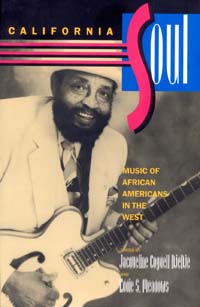 | Title: California soul: music of African Americans in the West Author: DjeDje, Jacqueline Cogdell Published: University of California Press, 1998 Subjects: Music | African American Studies | American Studies | California and the West | Californian and Western History | United States History | Contemporary Music | Jazz Publisher's Description: This new series, co-sponsored with The Center for Black Music Research of Columbia College, seeks to increase our understanding of black music genres and their importance to the cultures of the Atlantic world, including their influence on African musical styles. Books in the series will examine the wide-ranging music of the African diaspora - including the folk-derived musical styles of the Americas as well as European-influenced concert hall music of the entire black Atlantic world - by analyzing issues critical to our interpretation of the music itself and exploring the relationships between music and the other black expressive arts.Focusing on blues, jazz, gospel, rhythm and blues, and soul music, California Soul is one of the first books to explore the rich musical heritage of African Americans in California. The contributors describe in detail the individual artists, locales, groups, musical styles, and regional qualities, and the result is an important book that lays the groundwork for a whole new field of study. The essays draw from oral histories, music recordings, newspaper articles and advertisements, as well as population statistics to provide insightful discussions of topics like the California urban milieu's influence on gospel music, the development of the West Coast blues style, and the significance of Los Angeles's Central Avenue in the early days of jazz. Other essays offer perspectives on how individual musicians have been shaped by their African American heritage, and on the role of the record industry and radio in the making of music. In addition to the diverse range of essays, the book includes the most comprehensive bibliography now available on African American music and culture in California. [brief] Similar Items |
| 59. | 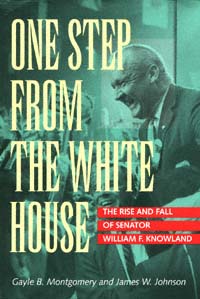 | Title: One step from the White House: the rise and fall of Senator William F. Knowland Author: Montgomery, Gayle B 1934- Published: University of California Press, 1998 Subjects: Politics | Autobiographies and Biographies | California and the West | Californian and Western History | American Studies | United States History Publisher's Description: During the Cold War years of the 1950s, William F. Knowland was one of the most important figures in American politics. As the Republican leader of the U.S. Senate, the wealthy California newspaper heir was recognized and respected by millions. His influence with President Eisenhower led to Earl Warren's appointment as chief justice, and Knowland set in motion a U.S.-China policy that remains part of our international direction today. Yet he committed suicide in 1974, following a personal decline that included political humiliation, a ruined marriage, and the loss of his family fortune.This is the first full-scale biography of Bill Knowland, written by two journalists who came to know him after he left Washington in 1958. Gayle B. Montgomery was a political editor at the Oakland Tribune , the newspaper owned by Knowland's father, the power-wielding Joseph R. Knowland. James W. Johnson was a Tribune editorial writer. Both men worked with Knowland when he returned to the newspaper after giving up his Senate seat in a failed bid to become governor of California. Knowland lost the governorship race to Edmund G. (Pat) Brown; had he won, many observers felt Knowland would have had a clear shot at the White House.This is a book not only about Mr. Republican, but also one that illuminates the strengths and deficiencies of Republican party politics during the years when the party was at its zenith. In portraying the life of Bill Knowland, the authors cast a glaring light both on the machinations of political power and on the Republican establishment's aspirations in the Warren-Eisenhower era. [brief] Similar Items |
| 60. | 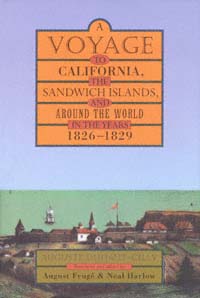 | Title: A voyage to California, the Sandwich Islands & around the world in the years, 1826-1829 Author: Duhaut-Cilly, Auguste Bernard 1790-1849 Published: University of California Press, 1999 Subjects: California and the West | Californian and Western History | United States History | Literature in Translation | Travel Publisher's Description: While French sea captain Auguste Duhaut-Cilly may not have become wealthy from his around-the-world travels between 1826 and 1829, his trip has enriched historians interested in early nineteenth-century California. Because of a poor choice in goods to trade he found it necessary to spend nearly two years on the Alta and Baja California coasts before disposing of his cargo and returning to France. What was bad luck for Duhaut-Cilly was good luck for us, however, because he recorded his impressions of the region's natural history and human populations in a diary. This translation of Duhaut-Cilly's writing offers today's readers a rare eyewitness account of the pastoral society that was Mexican California, including the missions at the height of their power.A veteran of the Napoleonic wars, Duhaut-Cilly was an educated man conversant in Spanish and English. He was also Catholic, which gave him special access to the California missions. Thus his diary allows the reader an insider's view of the padres' lives, including their dealings with the military. Through his eyes we see the region's indigenous people and how they were treated, and we're privy to his commentary on the behavior of the Californios.This translation also contains Duhaut-Cilly's account of the Sandwich Islands portion of his voyage and provides an authentic rendering of life at sea during the early nineteenth century. In the spirit of Richard Henry Dana's Two Years before the Mast , Duhaut-Cilly's reflections are a historical gem for anyone with a love of personal narratives and original accounts of the past. [brief] Similar Items |